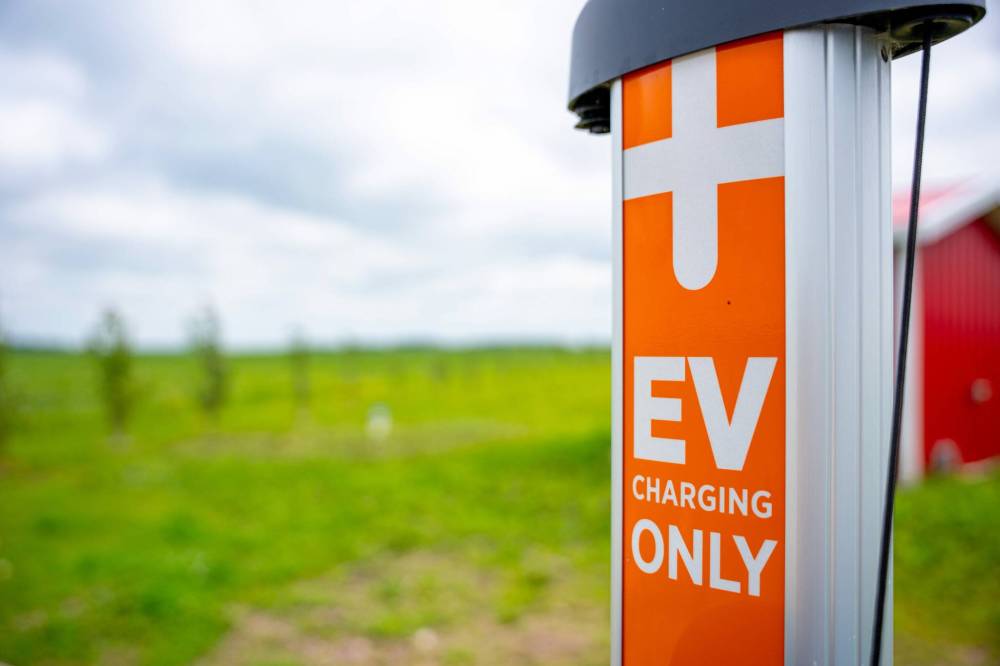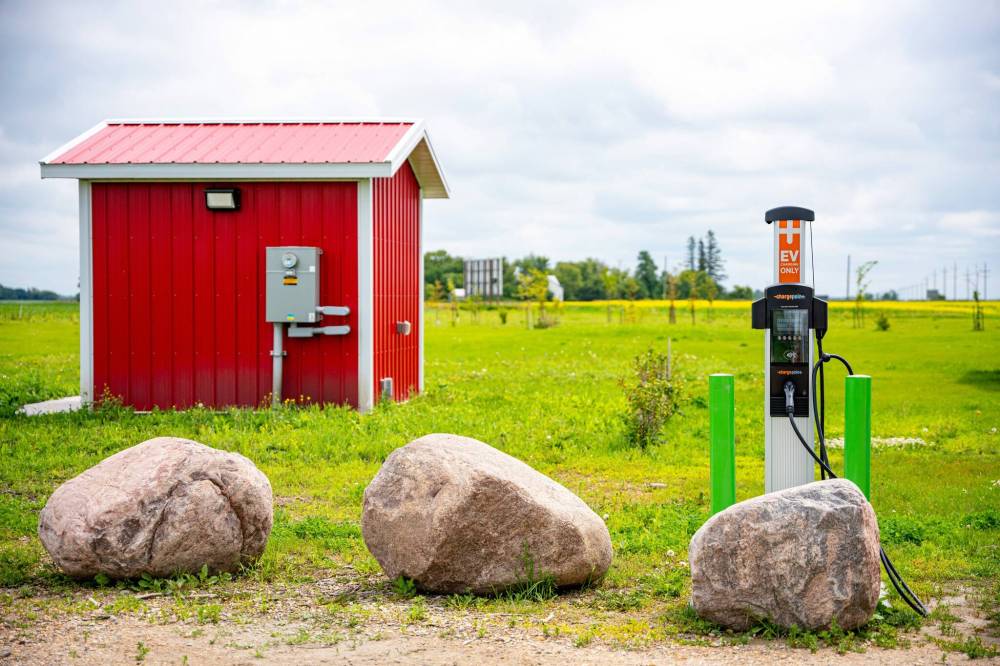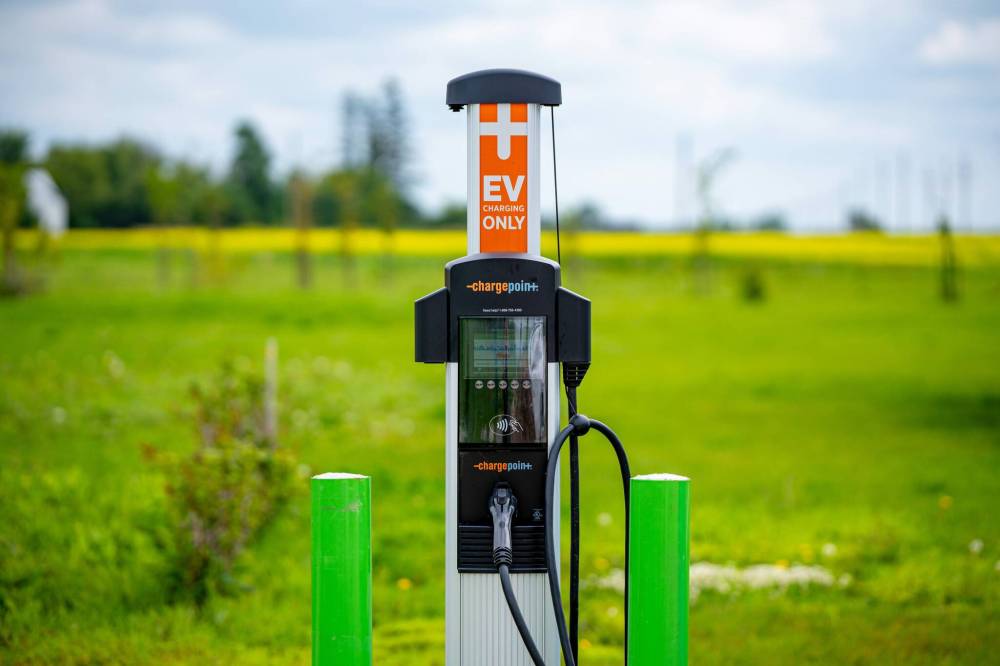Province set to build six EV charging stations
Network between Winnipeg, Thompson part of path to net-zero emissions
Advertisement
Read this article for free:
or
Already have an account? Log in here »
To continue reading, please subscribe:
Monthly Digital Subscription
$0 for the first 4 weeks*
- Enjoy unlimited reading on winnipegfreepress.com
- Read the E-Edition, our digital replica newspaper
- Access News Break, our award-winning app
- Play interactive puzzles
*No charge for 4 weeks then price increases to the regular rate of $19.95 plus GST every four weeks. Offer available to new and qualified returning subscribers only. Cancel any time.
Monthly Digital Subscription
$4.99/week*
- Enjoy unlimited reading on winnipegfreepress.com
- Read the E-Edition, our digital replica newspaper
- Access News Break, our award-winning app
- Play interactive puzzles
*Billed as $19.95 plus GST every four weeks. Cancel any time.
To continue reading, please subscribe:
Add Free Press access to your Brandon Sun subscription for only an additional
$1 for the first 4 weeks*
*Your next subscription payment will increase by $1.00 and you will be charged $16.99 plus GST for four weeks. After four weeks, your payment will increase to $23.99 plus GST every four weeks.
Read unlimited articles for free today:
or
Already have an account? Log in here »
The Manitoba government plans to build a network of six high-powered electric vehicle charging stations between Winnipeg and Thompson in the coming years as part of an ambitious roadmap to lead the province to net-zero emissions.
Filling the gaps in the province’s electric vehicle infrastructure is a highlight of the Kinew government’s all-hands-on-deck effort to curb Manitoba’s carbon emissions by 2050. The full plan will be announced this morning.
In an exclusive interview, Environment and Climate Change Minister Mike Moyes said he’s hopeful the new charging infrastructure will give more Manitobans, particularly those living in the province’s northern and remote communities, confidence to make the switch to low-emission vehicles.

“This is a way that we’re trying to connect people, connect different communities and really decrease that range anxiety, which we know is one of the reasons why people are sometimes unsure about whether it’s the right fit for them and their family,” he said.
The new level-three chargers — which can fill an electric vehicle battery in 20 to 30 minutes — will bring the total number of charging stations across the province to nearly 300. Critically, they’ll add to the dozen existing stations in northern Manitoba.
“It’s going to be a quick way for people to charge up their EVs,” Moyes said.
“We recognize that transportation is one of the major sectors of emissions and something that we need to decarbonize, so we want to make sure that people have the confidence they need to either leave the city, for one, or to consider buying an EV if they’re in the market.”
While exact locations are yet to be decided, the chargers are expected to be installed about 150 kilometres apart in the communities of Lundar, Lake St. Martin, Grand Rapids, Ponton, Wabowden and Thompson. Moyes said the infrastructure will cost approximately $9.2 million and will be fully operational by April 2027.
The announcement builds on a $500,000 commitment made earlier this year to support the construction of 51 chargers across southwestern Manitoba.

The six new stations are the first to be publicly owned and overseen by Manitoba Hydro, the Crown provincial utility. Moyes said the public ownership signals the province’s “great confidence” in the future of electric vehicle technology.
Experts agree a robust network of charging infrastructure is critical to encouraging electric vehicle adoption.
An auditor general review of the federal government’s charging infrastructure program in 2023 found “many areas of the country still lacked access to public charging stations,” with northern, rural and Indigenous communities facing the steepest gaps.
Speaking with the Free Press/the Narwhal in 2024, Kent Heinrich, co-founder of the Manitoba-Ontario Free Ride EV educational program, suggested a network of chargers on the 760-kilometre route between Winnipeg and Thompson could be the first step toward making the technology accessible to all Manitobans.
“The beauty of it is, once the roadway has charging ability, then people within the communities north, east and west of the highway within a certain range can now take part in the provincial rebate program,” Heinrich said at the time.
That’s what the province is aiming to do.

“We’re trying to map everything out and ensure that we’re connecting as much of the province as possible,” Moyes said.
Moyes said the uptake in Manitoba has been steady despite the barriers to EV adoption, which include range anxiety, concerns about cold-weather performance and the drying up of federal rebate funds earlier this year.
More than 4,000 families have applied for the provincial rebate, which offers up to $4,000 toward the purchase of a new electric car, he said. Funding is expected to continue until March, or whenever the $25-million pot runs dry.
“This is such a great opportunity to move Manitoba’s economy into the next phase toward a low-carbon economy, so we’re excited to bring forward this path to net zero,” Moyes said.
More details about Manitoba’s plan to reach net-zero emissions by 2050 — which Moyes called a “comprehensive” and “over-arching” strategy involving all corners of government — will be released at an announcement today, with detailed action plans to follow.
The roadmap will tackle Manitoba’s most polluting sectors, including transportation, agriculture and building heat. Moyes said his department’s latest data shows just over 30 per cent of emissions stem from the transportation sector.

“We know that we have to do our part. More and more Manitobans were feeling the effects of climate change in the summer with the wildfires and the smoke that was in the air, so anything we can do to be leaders in this area goes a long way,” he said.
Julia-Simone Rutgers is a reporter covering environmental issues in Manitoba. Her position is part of a partnership between the Narwhal and the Winnipeg Free Press.
julia-simone.rutgers@freepress.mb.ca

Julia-Simone Rutgers is the Manitoba environment reporter for the Free Press and The Narwhal. She joined the Free Press in 2020, after completing a journalism degree at the University of King’s College in Halifax, and took on the environment beat in 2022. Read more about Julia-Simone.
Julia-Simone’s role is part of a partnership with The Narwhal, funded by the Winnipeg Foundation. Every piece of reporting Julia-Simone produces is reviewed by an editing team before it is posted online or published in print — part of the Free Press‘s tradition, since 1872, of producing reliable independent journalism. Read more about Free Press’s history and mandate, and learn how our newsroom operates.
Our newsroom depends on a growing audience of readers to power our journalism. If you are not a paid reader, please consider becoming a subscriber.
Our newsroom depends on its audience of readers to power our journalism. Thank you for your support.













